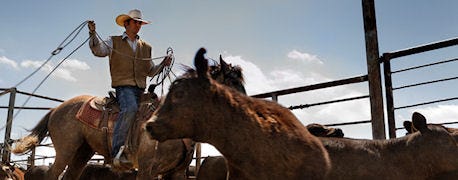
If offered another opportunity to share the story of their farms and ranches in documentary form, five of the farmer-participants in the new "Farmland" film on Thursday said they wouldn't hesitate to jump on board.
"I would do it again in a minute," fourth generation hog farmer Ryan Veldhuizen said during a press call just ahead of the film's Tribeca Festival debut in New York. He was joined by four other farmers who participated in the new documentary.
The film, which hits selected theatres May 1, focuses on the lives of young farmers in six different food production areas. It is billed as a glimpse into the farmers' "high-risk, high-reward" jobs.

Film participant Brad Bellah works on his family farm. Photo Credit: Don Holtz
"We're always interested in any chance to tell our story, share what we do on our farm, because we really enjoy it," said Leighton Cooley, a Georgia poultry farmer.
Related: Meet the Faces of "Farmland"
Director James Moll, who had little experience with agriculture prior to making the film, said it was created largely by following his farmer-subjects around their farms as they completed everyday tasks – offering an "intimate look," as the film's description says, into farm life.
"Saying it's an intimate look is really talking about getting an opportunity to basically hang out with [the farmers] while they do what they do. And with their families – so their professional lives and their personal lives," Moll said.
A family focus
For many of the farmers, their professional lives are their personal lives. David Loberg, Nebraska corn and soybean farmer, said part of his reason for participating in the film was to show consumers how farming allows him to interact with his family daily.
"When you work on a family farm you get to do two things that you love: you get to farm and you get to work with your family," Loberg said. "You work hard, you work long, but it's just a good lifestyle that I think everyone would want to grow up in."
~~~PAGE_BREAK_HERE~~~
Sutton Morgan, a California produce farmer, agreed with Loberg's comments. "The ability to work with my family is…amazing. I can't even express it," he said. "Sometimes we butt heads, sometimes we get along, but really it's just that family dynamic that I get to experience that I truly enjoy."
Consumer outreach
The farmers also said growing consumer confusion about food production was factored in to the decision to participate in the film. On one hand, they wanted to allow consumers in to see how food is produced, but on the other, they wanted to make sure the story told in the film would be accurate.
When Moll's production studios called, says Brad Bellah, a sixth-generation Texas cattle rancher, he was skeptical.
"I feel like many people in agriculture tend to feel like they've been burned a time or two, or know someone who has when it comes to the media," Bellah said. "Sometimes, things have been twisted before – so that was definitely a concern."
As a produce farmer, Morgan said marketing messages are easily distorted, but there's still a growing desire among consumers to know more about the food they purchase and consume. He said the film helped him fulfill his goal of reaching the consumer, and tell the story about where food comes from.
The film also helps consumers understand that the food is raised and cared for by a real person, Loberg added.
"We are just like them, we have families, we have kids, we have bad days, we have good days; they actually get to see that there's a living, human person behind what they see in the grocery store," he said.
~~~PAGE_BREAK_HERE~~~
After the filming, Bellah said despite initial concerns, he was confident in Moll's final product. "I'd just encourage any critics of agriculture to see the film. And then we'll talk."
Focus on the next generation
All of the film's participants personify the generational shift that is occuring in the agriculture industry – refocusing how tomorrow's farm operators may differ from their parents in the techniques they use and how they interact with consumers.
As young consumers themselves, the farmers are also using social media and adopting new technology at a faster rate. Loberg says that's why he thinks selecting younger farmers for the film was essential, because they represent a modern view of agriculture.
Related: Farmland Film Review: From a Farmer's Standpoint
"The younger people are facing a different world of producing," Loberg explained, "we're facing political and social pressures and new technology advancements – it's an ever-changing world in agriculture and we are the people that are going to be doing it for the next generation."
The filmmaker sees that shift, too. After the initial release, one goal for the film is to reach younger consumers through screenings on college and university campuses.
"I made the film for people who eat," Moll said. "I really do see a film that everyone will find interesting."
View the trailer and find a showing on the "Farmland" website.
About the Author(s)
You May Also Like




